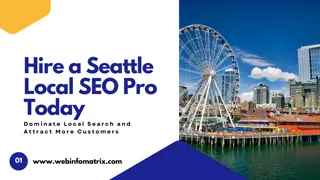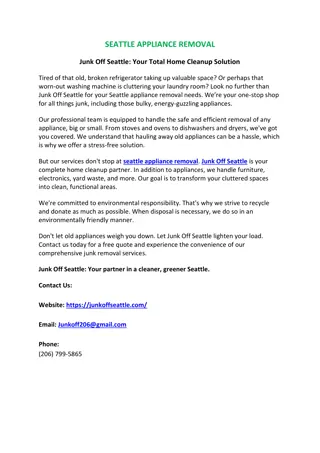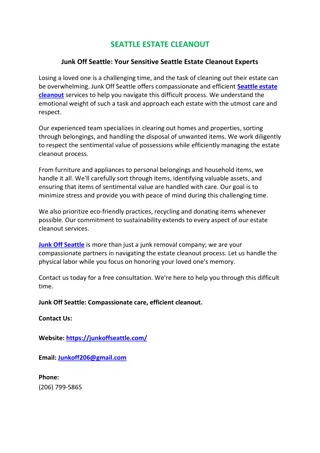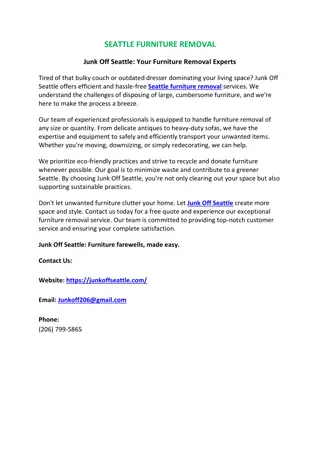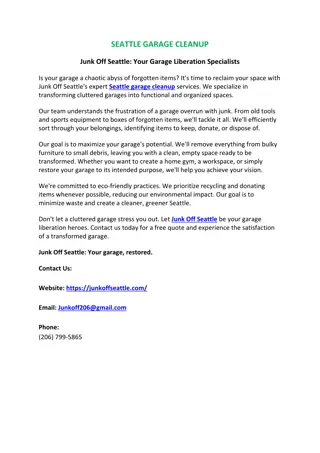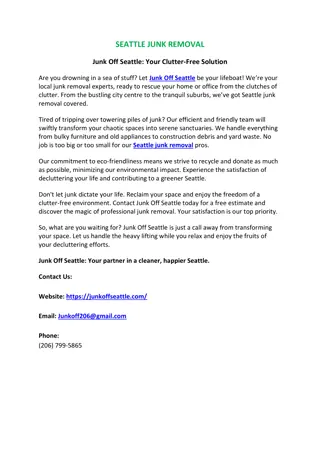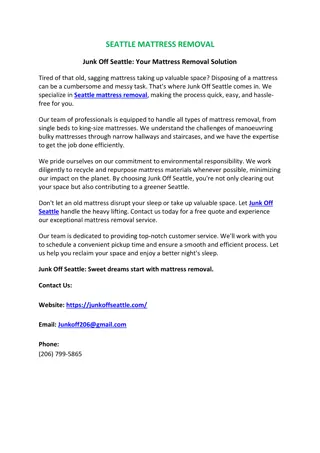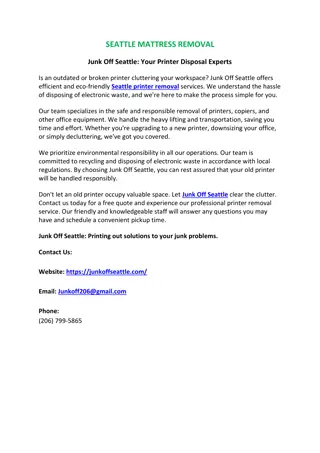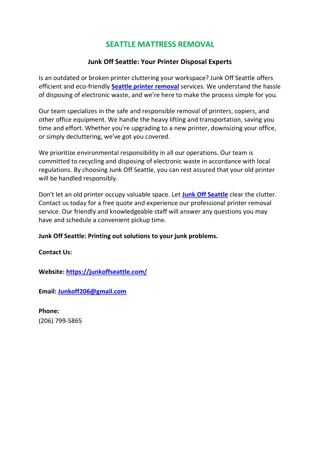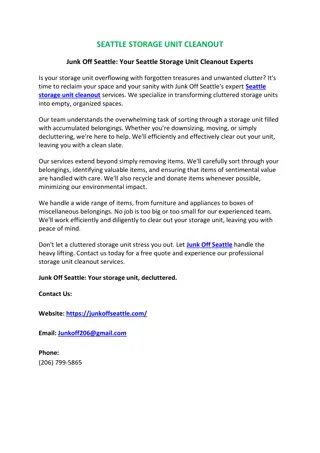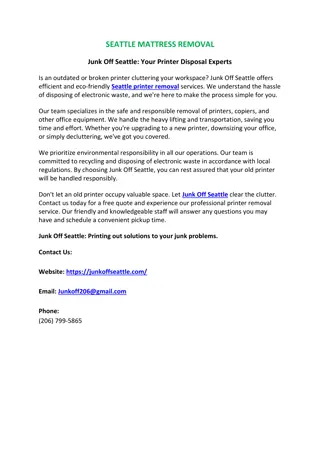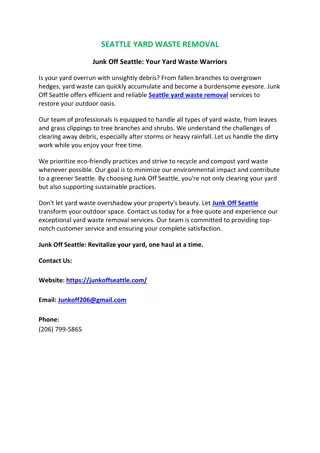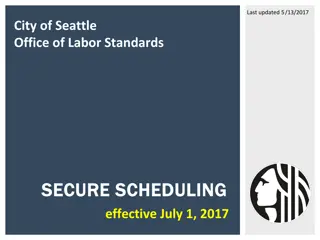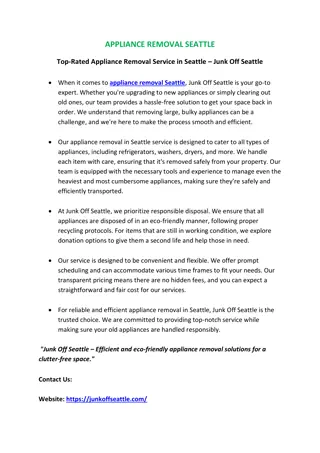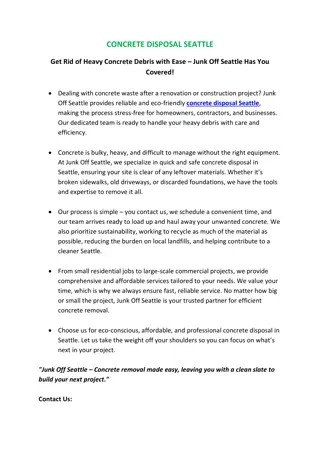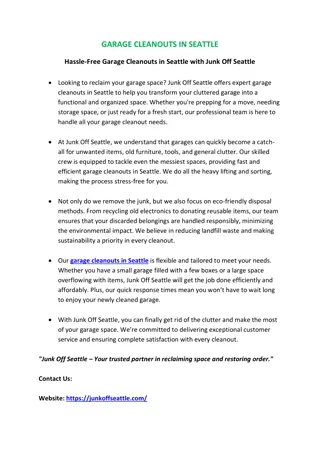Seattle Labor Standards Updates and FAQs 2018
Outreach OLS provides guidance on Seattle Labor Standards for employers and employees. Learn about minimum wages, PSST, and employee rights. Get answers on legal wage rates, PSST coverage, and accrued hours limits. Stay informed to ensure compliance with labor regulations.
Download Presentation

Please find below an Image/Link to download the presentation.
The content on the website is provided AS IS for your information and personal use only. It may not be sold, licensed, or shared on other websites without obtaining consent from the author.If you encounter any issues during the download, it is possible that the publisher has removed the file from their server.
You are allowed to download the files provided on this website for personal or commercial use, subject to the condition that they are used lawfully. All files are the property of their respective owners.
The content on the website is provided AS IS for your information and personal use only. It may not be sold, licensed, or shared on other websites without obtaining consent from the author.
E N D
Presentation Transcript
2018 Seattle Labor Standards Updates Scenarios Q & A Outreach OLS provides outreach and education to help employers comply with Seattle s Labor Standards and employees identify their rights to workplace protections and benefits. The information in this presentation should not be used as a substitute for laws and regulations. Employers are responsible for complying with all legal requirements. Last updated, 01-12-18
I work for a large, fast food chain, and earn $15/hour. Is that legal?
We need more info. In 2018, the minimum wage for a large employer is $15.45/hour or $15.00/hour if the employer pays toward medical benefits.
I own a small clothing store in Seattle. I pay my employees the state minimum wage Is that legal?
We need more info. Do your employees earn tips? Does your business pay toward individual employee medical benefits? In 2018, the state minimum wage is $11.50/hour. The Seattle minimum wage for a small employer is $14.00/hour or $11.50/hour plus $2.50 tips and/or employer payments toward the employee s medical benefits.
A new employee started working 100 days ago. The employee wants to take care of her adult daughter and her grandchild who are sick with the February Flu. Does PSST cover this absence?
Yes. In 2018, the waiting period for PSST is 90 days. Plus, family members include adult children and grandchildren.
I own a business with 15 employees. An employee has asked to use PSST for an upcoming surgery. The employee has accrued 60 PSST hours, but that s more than an employee has a legal right to use in a year, right? Can I limit the employee s use of PSST to 40 hours per year?
No. In 2018, there is no cap on using PSST hours; employees can use all accrued hours in one year.
My business has one employee. An employee asked to use PSST to help her roommate go to court regarding a temporary restraining order for a domestic violence situation. Does PSST cover this absence?
Yes. In 2018, PSST covers all employees in Seattle, regardless of the employer s size. Employees have a legal right to use Paid Safe Time for a covered reason.
My payroll provider said that employers must add more information to the PSST notification that we provide every paycheck. Does PSST require more?
Yes. In 2018, PSST notification must include available PSST hours and PSST hours accrued and reduced since the last pay period.
I just opened a new business with three employees who will earn commission. Is my business covered by PSST? If so, what do I pay?
Yesand no. In 2018, all employers operating in Seattle must follow state paid sick leave requirements. New tier 1 & 2 employers are exempted from more generous Seattle PSST requirements for two years. When providing PSST, employers must pay for commissions.
An employee wants to leave work 20 minutes early to care for a sick sibling. Can I require the employee to use a full hour of PSST?
It depends. Beginning 2018, your business can only require use of PSST in one-hour increments if that is the smallest increment used to track worker time. PSST covers care of siblings.
Ive heard that employers must reinstate previously accrued PSST if an employee quits and then returns to work. Does PSST require reinstatement? Is there a limit to the break in service?
Yesand yes. Employers must reinstate previously accrued/unused PSST when an employee quits and returns to work. The maximum break in service for this requirement is 12 months.
I work in Human Resources for a business with 30 employees. An employee asked if she could cash-out 50 unused PSST hours. Can employers permit employees to cash-out unused PSST?
Yesand no. Upon mutual agreement between the employer and employee, cash-out is permitted with restrictions. Employers may cash-out at end of year for hours that are in excess of carry-over requirements; employers may cash-out at separation of employment for any amount.
I am a new general manager. I heard that employers are required to provide each employee with a written PSST policy. What is the PSST policy supposed to include? Is there a template?
Requirements (1 of 2 slides) Type of year (e.g. calendar, fiscal year) Tier size Accrual, use and carry-over Manner of providing notification of available PSST hours (If applicable) Requirements for requesting PSST
Requirements (2 of 2 slides) Employee s right to PSST Prohibitions against retaliation If applicable, an explanation of Frontloading Verification requirements for use of PSST for more than three consecutive days Shared PSST program (i.e. donations to co-workers) PTO program
Our union steward told me that statewide paid sick leave requirements can t be waived in a CBA. Can employers waive Seattle PSST requirements in a CBA?
There is limited waiver. Employers are not allowed to waive statewide paid sick leave requirements in a CBA. Employers are allowed to waive Seattle PSST requirements through December 31, 2018 or through end of CBA in effect as of that date (only for the more generous statewide requirements such as tier 2 & 3 carry-over, and tier 3 accrual).
I am a server at a caf that adds service charges to the bill, but I am not getting this money. Is that legal?
We need more info. Money from service charges automatically belongs to employee(s) serving the customer unless the business has a disclosure statement on the menu or receipt stating that the money goes to the house.
Im a manager at a large hotel. I want to share my ideas with the City about how to Implement the Hotel Employees Health and Safety Initiative. What are my options?
Contact OLS! OLS is conducting HEHS rulemaking in early 2018. Contact us for more info (laborstandards@seattle.gov) and join our email list to receive updates.
Im registering for a 2018 business license with the City of Seattle and I m going to provide a 2017 NAICS code on my license. Are 2017 NAICS codes covered by the SS ordinance?
Yes! Employer coverage is determined by 2012 and 2017 NAICS codes for large food services and retail establishments.




